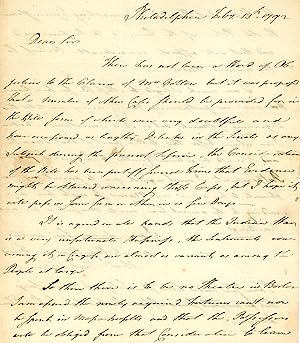Descripción
quarto, two pages, plus stamp less address leaf, in very good, clean, and legible condition. Strong writes: Dear Sir, There has not been a Word of Objection to the Claime of Mr. Cotton but it was professed that a number of these cases should be provided for in the Bill some of which were very doubtful and have occasioned as lengthy Debates in the Senate as any Subject during the present Session, the Consideration of the Bill has been put off several times that Evidence might be obtained concerning those cases, but I hope it will pass in some form or other in a few days. It is agreed on all hands that the Indian War is a very unfortunate Business, the Sentiments concerning it in Congress are almost as variant as among the People at large. So then there is to be no Theatre in Boston I am afraid the newly acquired fortunes can?t now be spent in Massachusetts and that the Possessors will be obliged from that Consideration to leave the State ? but there is one considering Circumstance the old Police of the Town is to be preserved and that will afford considerable relief to the married men. I am much obliged to Miss B. for her Complaisance in postponing the Ceremony until the Beginning of March but as it is uncertain whether I can return before the latter part of that month and it would be extreme Cruelty to Suggest a further Postponement I must request you to present my compliments to her and in my name at the wedding to wish her according to the ancient form, much Comfort in her new Boundings. I am dear Sir with Much Regard your friend & Servt Caleb Strong I have just had a Letter from Sedgwick which says that he proposed setting off from Stockbridge for this place today ? ? Caleb Strong (1745-1819) was a lawyer, Federalist Statesman, Massachusetts legislator and official. He graduated from Harvard in 1764; studied law under Joseph Hawley; was admitted to Massachusetts bar, 1772. Served on committee for drafting the Massachusetts constitution, 1779. He represented Massachusetts in the Federal Constitutional Convention in Philadelphia, 1787, advocating annual elections of representatives and choice of a president by Congress, also making the successful motion that the House alone should originate spending bills although the Senate might amend them. He served as U. S. Senator from Massachusetts, 1789-1796, he formed, with Oliver Ellsworth and Rufus King the bulwark of the administration in the Senate. He contributed to the drafting of the Judiciary Act of 1789, espoused the Hamiltonian financial plan, and introduced the bill for the chartering of the first Bank of the United States. At the beginning of the two-party system he associated himself with the Washington administration and the Federalists, supported the ratification of the Jay Treaty, and deplored the excesses of the French revolutionary government. As Federalist governor of Massachusetts, 1800-1807, he was an able administrator; during his second period as governor, 1812-1816, he was in continuous opposition to the national administration and the War of 1812. He approved both the calling of the Hartford Convention in December 1814 and its subsequent report. American National Biography, vol. 21 pp., 39-41. N° de ref. del artículo 030912
Contactar al vendedor
Denunciar este artículo
![]()
